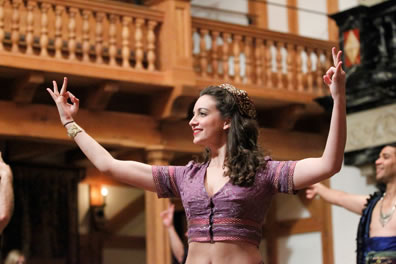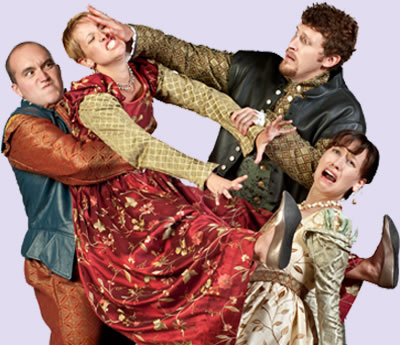A Midsummer Night’s Dream
A Dream with a Most Palpable Bottom
American Shakespeare Center, Blackfriars Playhouse, Staunton, Va.,
Thursday, December 1, 2011, M—15&16 (back left stalls)
Directed by Kathleen Powers

Stephanie Holladay Earl as Titania in A Midsummer Night's Dream at the Blackfriars Playhouse. Her Titania could make men, spirits, and even gods cower. Photo by Tommy Thompson, American Shakespeare Center.
Take the purest Shakespeare and present it to the toughest audience. In this laboratory we investigate Shakespeare’s accessibility and relevance in our times. This may sound like any Shakespearean actor’s challenge, but in this instance I was the one feeling challenged, entering the theater with a shaken faith.
That faith was first stirred when my wife and I saw The Mistorical Hystery of Henry (I)V at WSC Avant Bard, what I considered a mostly successful mash-up of Shakespeare’s Richard II, Henry IV Parts One and Two, and Henry V. In a talkback session afterward, one actor dismissed unadulterated Shakespeare as of no interest to most people, and another actor said “nobody would sit through a production of Henry VI, Part Two.” We spoke up, saying we had seen that play in its original form at the Blackfriars last year. After getting over his apparent surprise, the actor regarded us as singular and held firm to his contention that Shakespeare required a revisionist vision from a director/adapter to be successful theater today. I wasn’t given the opportunity to argue that after seeing three versions of the Henry VI trilogy, two of those compressed through revisionist prisms, the one most enthusiastically received by the audience was the version at the Blackfriars that stuck strictly to Shakespeare’s script and staging devices.
Hard on the heels of this discussion came an e-mail exchange with a professional actor who also contended that without distilling Shakespeare through a conceptual framework, his works are inaccessible as both literature and drama. He cited as final authority his long experience as a professional actor, dismissing my long experience as an audience. I’ve seen more than 200 productions of Shakespeare, both conceptualized and textcentric, and among the buzziest audiences I’ve been in were those watching bare-bones productions at Blackfriars and the Atlanta Shakespeare Tavern as well as the Cymbeline, Winter’s Tale, and Tempest at England’s National Theatre in 1988, not to mention that theater’s 100-performance run of a by-the-book Antony and Cleopatra in 1987.
Cluttering these discussions were two key variables. One: Are Sarah and I just weird? Does our long history with Shakespeare make us unique in regarding text-true Shakespeare just as interesting and usually more entertaining than conceptualized Shakespeare? Two: Are the actors in this debate clouded by their own baggage that they may be bringing to Shakespeare from, say, a bad high school teacher forcing Julius Caesar down their throats, or a bad production by actors who hadn’t mastered the nuances of Shakespeare’s verse?
The golden opportunity to put these questions to the test came when I took my son Jon—just graduated with a degree in theater arts from the University of Alaska-Anchorage—to the Blackfriars Playhouse to see ASC’s Almost Blasphemy Tour production of A Midsummer Night’s Dream. The rest of the audience for this 10:30 a.m. presentation was middle and high school students with a few stressed teachers. I can think of no better place (a theater using no sets or electronic effects and a performance philosophy based on strict readings of the text) or audience upon which to test the accessibility of Shakespeare in the 21st century.
Thus, I watched the audience as much as the play. For every kid digging what was happening on stage were two or three kids watching in bewilderment (hard to read in a 14-year-old whether bewilderment is a win or loss) and another two or three kids hunched in stone-faced boredom because they weren’t even allowed to text their friends, for god’s sake. One girl laughed at even some of the obscure jokes and poked an appreciative elbow at her friend who returned disgusted glances that asked, how can anyone even watch this?
The action on stage was rambunctiously physical, but not far beyond the textual clues. The Athenians wore Elizabethan costume, the fairies were exotically outfitted as East Indian, and Hippolyta (Stephanie Holladay Earl) sported a leather-clad warrior and huntress outfit. Earl made Theseus’s fiancée a most aggressive and obstinate yet loving foil to Athen's duke played with authority by Daniel Abraham Stevens. Earl doubled as a bare-midriffed, hip-sashaying Titania that got even the stone-faced boys to take notice. Michael Amendola as an impishly naïve Puck wiggled his butt to delighted giggling in the audience; doubling as a closeted cross-dressing Starveling, Amendola squealed delightedly himself upon learning that he was to play Thisbe’s mother (and was crest-fallen when he was recast as Moonshine).
In the most unusual role doubling I’ve ever seen in a Dream, Oberon was paired with Snug. Eugene Douglas played the latter as painfully shy, constantly emulating Bottom’s exaggerated poses and gestures, but his tempestuously macho Oberon was strong enough to rule a Titania who could make most men, spirits, and gods cower. Ronald Peet turned in a triple-headed (or, perhaps, quadruple-headed) performance as an arrogant Philostrate, a confused Peaseblossom, and a seriously self-conscious Flute. As Thisbee, Flute seemed to think that standing tiptoe on one leg like a flute-playing Ian Anderson was the way to play a lady. But when his Thisbe came on stage to hear Hippolyta say “I hope she will be brief,” Peet’s Flute dropped character and gave the warrior queen the most withering look, inspiring one of the morning’s loudest laughs not generated by Bottom.
ASC tour troupe veteran Rick Blunt was born to play Bottom; and his Bottom was born to play Pyramus. Blunt gave Bottom a proud bearing and grand gestures, and Bottom gave Pyramus the proudest of bearings and grandest of gestures, not to mention the cruelest of deaths—after confusing paps, Bottom swallowed his sword before spewing up a huge red cloth, capping Blunt's laugh-gasp-laugh coaster ride of a performance. Answering Titania’s query of what he would “desirest to eat,” Blunt’s Bottom turned to the luscious lady and in a creepily seductive mode replied, “I could munch your good dry oats.” That drew a shocked laugh from the audience, including me who in 15 previous viewings and countless readings of this play never knew that line could be so funny. A comedian who knows how to play a playhouse like a jazz saxophonist working his keys, Blunt later delivered his wake-up speech and prompted the audience to fill in the title of his dream. When several students offered “Midsummer Night’s Dream,” he dropped his arms and head in disappointment. “No, Bottom’s dream,” he said, tuning Shakespeare’s line to a duh! tone. “Because it hath no bottom” he continued, which earned a gotcha laugh.
But it wasn’t the gasps and laughs with which I gauge whether this production succeeded as “accessible Shakespeare” to a much-disinterested crowd of midteens. There were a couple of other defining moments, and for the first of those we turn to the four lovers: ASC vets Jake Mahler as Lysander and Denice Mahler (nee, Burbach) as Hermia, and newcomers Patrick Earl as Demetrius and Bridget Rue as Helena. The performances of all four were, individually and in ensemble, sharp and fetching. In the concisely choreographed physical humor of the quarreling lovers scene, Demetrius and Lysander worked in perfect tandem to keep Hermia from Helena and then, on a sudden and just as earnestly, the two men would scrap with each other in flurries of slapping, biting, and nipple-twisting.

From left, Jake Mahler (Lysander), Denice Mahler (Hermia), Patrick Earl (Demetrius), and Bridget Rue (Helena). Photo by Michael Bailey, American Shakespeare Center.
Despite Rue's obvious talent, this production’s interpretation of Helena as a woman with borderline personality disorder and somewhat manic depressive dampened her lines’ humo. Yet, it at least served to explain two of the play’s anomalous moments: why she tells Demetrious of Hermia’s flight, and why she so quickly accuses Hermia of being part of the mockery plot. Hermia, in dismay at her friend’s accusation and Lysander’s behavior, could not grasp Lysander’s authentic change of affection, but when she did, she turned to all-consuming fury. After she seethed “How low am I, thou painted maypole?” the audience responded with “ooooooohhhh.” Shortly after came another interjection of astonishment as Lysander threw Hermia to the floor with a “Get you gone, you dwarf.” Except for the one girl’s disgusted friend—still in whatever mode—every kid, even the previously bored, was now leaning toward the stage. The actors were in Elizabethan dress and speaking iambic pentameter verse, but, really, how different was this scene from what these kids get on Gossip Girls, Vampire Diaries, and How I Met Your Mother?
The other defining moment came at play’s end. As Puck gave his epilogue, I saw nary a stone face, and even the previously disgusted girlfriend was now watching the fairy with interest. Puck done, the students applauded enthusiastically (expected) and the cast scored a second curtain call (expected). But as the clapping subsided, a group of boys started chanting “More! More! More!” (clowning, perhaps?), and piercing through the chant came a single shout of “Freebird!” that earned the morning’s final laugh.
So, to all those theater professionals—and I honor you all—who contend that Shakespeare is inaccessible to a modern audience without the alembic of a conceptual device, I urge you to check out the real deal just once. I remain convinced that combining Shakespeare’s original text and staging devices with skilled verse speakers can create gripping theater of universal relevance even for an audience uninitiated in Bardology. If some kid could score the appreciation of his fellows by shouting something idiomatic of the ’70s, they are clever enough to get Shakespeare without forcing his relevance on them.
Eric Minton
December 8, 2011
A review of the April 28, 2012, performance appears on PlayShakespeare.com
Comment: e-mail editorial@shakespeareances.com
Start a discussion in the Bardroom



 Find additional Shakespeareances
Find additional Shakespeareances